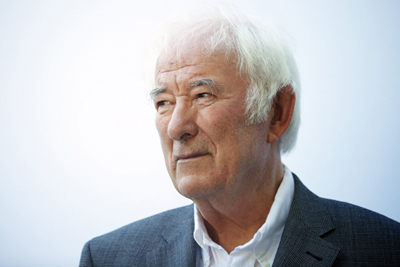Tribute to Seamus Heaney (1939-2013)
The Irish poet Seamus Heaney died this year. Huiwen Shi remembers him.

Timeline
Pen Work, Field Work, Dream Work: Monday, March 6, 2006 at HKU’s Loke Yew Hall, beginning at 5:30pm
The very first time I came to the University of Hong Kong, I travelled all the way from the New Territories for a public lecture. I was mesmerized by both the HKU Main Building and the Nobel laureate, not because they were too good to be true, but because they were somehow familiar. The Main Building resembles a few colonial buildings back in Shanghai, making me feel at home, while Heaney’s account of personal stories brought the distant Irish landscape of Mossbawn and Anahorish to life. He had a mild Irish accent, purling poems in a deep and compassionate voice. Having just started reading Heaney, I understood his beauty in a very limited way, but I liked him at first sight. Later on, I realized how magical it was to have been in the same space with the poet I wrote about—most of the time we never get to see the writers in person; they are abstract names; and often these names belong to those who have been long gone.
It is still very strange for me to think that he is gone now.
Outloud: Wednesday, February 14, 2007 at the Fringe Club, 6:30 pm
Valentine’s Day. My first attempt to read poems in public: Heaney’s “Follower” and my autobiographical poem on my father’s aging process. My poem was confident because of Heaney’s guidance and company.
Years later, I still remember that evening fondly.
Proposal Night: Thursday, November 8, 2012 at home, 11:00 pm
I was struggling to piece together a research proposal. Instead of producing something useful, I had this:
To Heaney
I years have been from you
And now before the lines
My darkness is set echoing
That humble, belittled girl
Thrilled and daunted
Afraid and fearless of nothing
Through your rhyme I see myself
Again
Death of Mr. Head-the-Ball: Friday, August 30, 2013, Tin Tin Bar, 9:00 pm
“Apparently, Seamus Heaney is dead.” A friend announced after his trip to the restroom.
A couple of days later, Paul Muldoon delivered the eulogy in which he referred to Heaney as “bounteous,” “bouncy,” “benign,” “big-hearted” and, most interestingly, “head-the-ball,” the nickname given to Heaney by his son, Michael—a lovely symbol of a relaxed relationship between father and son. In his speech, Muldoon celebrated Heaney’s life as a human being, not as a poet.
In a way, Heaney’s poems are unfashionable: drawn from real-life experience, nothing illusive and intangible, not so modern. But I love his down-to-earthness, his unique word choice, and his simplicity. He is able to engage you in small places and small pleasures, and then something profound starts to hit you. Poetry, Heaney once remarked, paraphrasing Robert Frost, “begins in delight and ends in self-consciousness.”
A lot of Heaney’s poems are elegiac. Strangely, I kind of expect him to write about his death too, knowing his ability to make a poem painful and soothing at the same time.
District and Circle: Thursday, October 10, 2013, Research Student Common Room, 8F Run Run Shaw Tower, HKU, 3:00 pm
Seven and a half years later, a brand new campus, an unfamiliar building, a stunning view from the 8th floor. I am here, brought back by Heaney, in spirit.
I believe we have unfinished business between the two of us.
“The dead here are borne/Towards the future.” (Human Chain)

Our apologies, you must be logged in to post a comment.